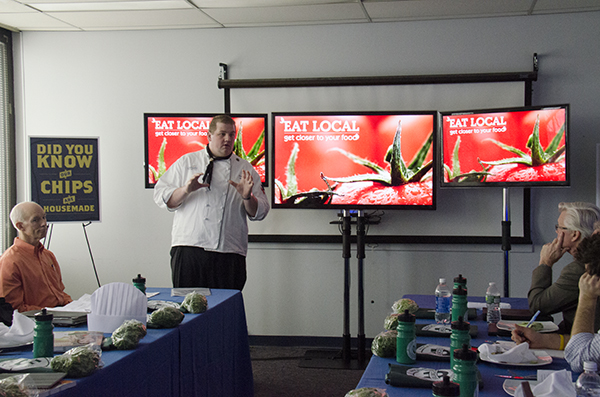
Executive Director of Campus Auxiliary Services Steve Deutsch recently announced in an email sent to the CAS Board that they will hold a closed meeting on March 13 to decide who SUNY New Paltz will choose as a food vendor beginning in fall 2013.
The Board met on Monday, Feb. 11 with each of the three vendors in closed presentations where vendors Sodexo, Aramark and Chartwells discussed what they would bring to the campus community if they were to be selected as the school’s next food service provider.
Students not representative of the CAS Board showed up to each presentation, but were turned away at the door. Deutsch said the meetings were kept closed because it was specifically a time for just the food service providers and the CAS Board to present and ask questions, respectively.
“This has been a two-year process with tons of documents to go through,” Deutsch said. “It’s not that we don’t want students to know what’s going on, we have videos of each presentation on the CAS website for people to view. We just don’t want people not fully informed on the issue to be at those meetings with people who do know what’s going on.”
Sodexo, New Paltz’s current food service provider, gave the first presentation of the day. They said they currently spend close to $1.4 million on local foods gathered within 50 miles on the campus.
Regional District Manager Rick Riani said 20 percent of what New Paltz and Sodexo spends on food is local, and that should Sodexo be chosen as the food service provider again, one of their priorities would be to increase the percentage.
“Our goal in our proposal is to get to 25 percent by 2014,” Riani said. “It’s definitely doable with programs like the Better Tomorrow program, a global program with commitments to health, community and the environment.”
Riani said the Better Tomorrow program would look to reduce packaging and waste products on campus, and would explore ways to increase sustainability. General Manager of Food Service Ralph Perez-Rogers said that not only would Sodexo attempt to improve sustainability, but they would get student feedback as well.
“With Oscar’s, we listened to students when they said they wanted it back,” Perez-Rogers said. “We sent out surveys and collected data, and Oscar’s reopened. It’s been a big hit.”
Perez-Rogers also said Sodexo would look to expand the size of Hasbrouck Dining Hall in order to allow more seating.
Aramark was the next food service provider to present to the board. Like Sodexo, they also discussed locally-grown food and sustainability on campus. Director of Business Management for Aramark Jennifer Eule said that even though they would like to bring in national brands such as Subway and Dunkin Donuts, they want to include improved local options as well.
“Even with national brands, we can customize the menu so that it complements the New Paltz dining experience,” Eule said. “We have a local board station that we’d like to have in Hasbrouck that would provide foods that are just from New York State.”
Eule said along with local concerns, Aramark will focus on engaging students on campus with social media and smartphone apps. This is also a plan of Chartwells, who was the last group to present that day.
Chartwells, the current food service provider on other SUNY campuses such as Purchase, Plattsburgh and Old Westbury, said they would plan on offering a mobile app that could access “nearly everything about dining services in the palm of your hand,” Chartwells Regional Marketing Director Kevin Howard said.
“We understand students are constantly on the go and don’t always have time to stop and sit down and eat,” Howard said. “With the app, students can order food made to order and pick it up once they finish up class.”
While Deutsch said the meetings were an informative way for the board to get a better pulse on what each food service provider would bring to New Paltz, students are displeased with the lack of information they were provided with by the CAS Board.
Student Senators Annie Courtens and Rebecca Berlin both said they understand why Deutsch did not want students at the meeting, but were unhappy that students were barely being informed by the board on what was going on.
“There are a lot of documents to go through and I understand why the board wouldn’t want all of those students there,” Berlin said. “With that being said, students want to get involved and they want to know what is going on, and the fact that we’re not being involved more with what little representation we have on the board, it’s a problem.”
Courtens said student representation is necessary for a CAS Board that wants to be transparent with the student body, and that turning students away from that meeting makes relationships between the two groups hostile.
“Even if the meetings are online, they don’t publicize that,” Courtens said. “It makes it look like they’re trying to hide something, and what students are eating is something that shouldn’t be hidden from the student body at all.”

